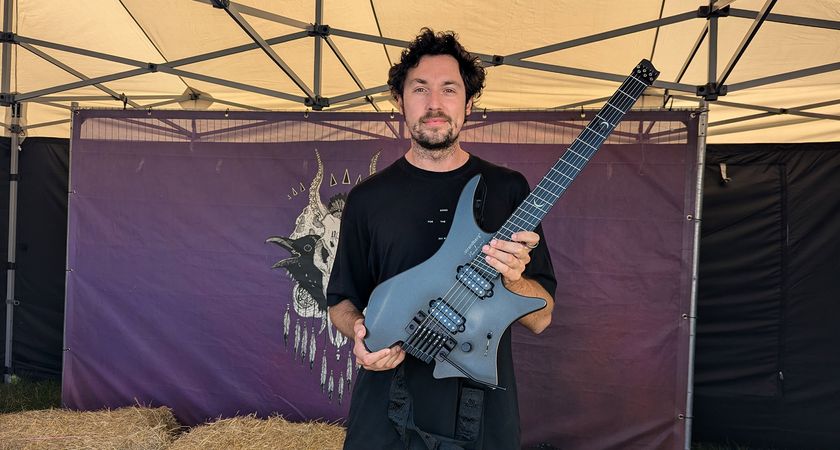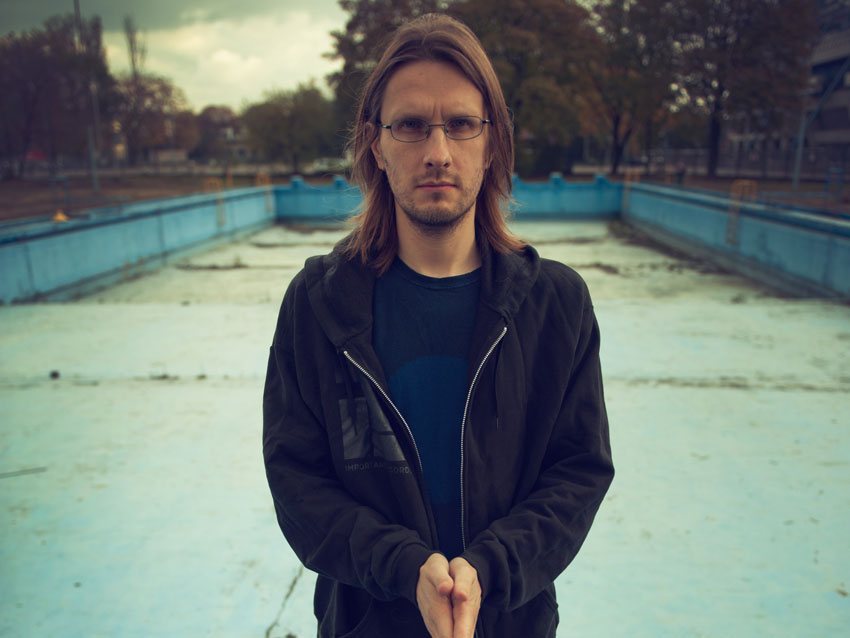
Last September, Steven Wilson, the astonishingly nonrepetitive frontman for the progressive-rock band Porcupine Tree, released his second solo album, Grace For Drowning. Rapturously received, the record received a Grammy nomination for Best Surround Sound Album and marked an important turning point in Wilson's already storied career, firmly establishing the eclectic musician as a daring solo artist to be reckoned with.
Earlier this year, Wilson embarked on his first solo tour, and to bring his music to the stage he handpicked a band of top-flight players, featuring Marco Minnemann (drums), Nick Beggs (bass), Niko Tsonev (guitars), Theo Travis (flute and sax) and Adam Holzman (keyboards).
Five shows into the 26-date run, the band played a concert at the Teatro Metropólitan in Mexico City, and that performance is captured on the upcoming Get All You Deserve, a sparkling 16-song set that features the debut of an epic new song, Luminol, along with striking imagery concocted by Wilson and his longtime visual collaborator, Lasse Hollie. (Get All You Deserve will be released on 25 September. You can pre-order it here.)
Later this week, Wilson will travel to Los Angeles to begin recording his next solo disc, with legendary record maker Alan Parsons engineering. We caught up with the maverick musician recently to talk about the making of Get All You Deserve, what it was like performing solo with a brand-new band and why he thinks his new music will take things "to the next level."
In plotting out a concert film like this, how does the process start? How do you and Lasse work together?
"Well, the process doesn't start with the film, but rather, it starts with tour itself, establishing the choreography of the show. The filming process merely becomes a documentation of the performance. Right back in the middle of last summer, when I finished my last studio record, I knew that I was going to be touring for the first time as a solo artist to promote the album, so at that point I sat down and thought about every aspect of the show - the musicians I thought I would need, the kind of crew we should have, the kind of light show I would want, and most significant in regards to the DVD, the kind of visual aspects that I think are above and beyond what people might expect from going to a rock 'n' roll show.
"That's where Lasse comes in, and that's where we drew on films we already had. For example, the film we made for Harmony Korine, which we did for the previous album - we had that available. Some other visuals we already created for web streaming and for the Blu-ray edition of the last studio record.
Get the MusicRadar Newsletter
Want all the hottest music and gear news, reviews, deals, features and more, direct to your inbox? Sign up here.
"And then we started to think about other ways to make the show very different. For example, I was very keen on having the band play behind transparent gauze for at least part of the show so that we could project film in front of them. This was to create shadows and light and a kind of interest in the show. So that's what was floating around, and the first thing I did was create a long document of ideas and how I thought they would unfold during the two-hour period of time. Lasse was a part of that, and we created visuals specifically to fit into it all.
"In documenting the show, we went for high-definition cameras. We had 17 of them, which is a lot; that's about as many as you can imagine having for filming a show. We didn't want to skimp on trying to encapsulate the magical experience, if you will."
With so many cameras, did you have to change the show around from what you were already doing?
"No, I would say the opposite, because when you have so many cameras, there's pretty much one trained on everybody the entire time. So you don't have to make certain choices in the filming; that can all be done in the editing. We had cameras on the back of the room the whole time, we had camera at the front of the stage, we had small keyhole cameras on the keyboards - everything was being captured. When Lasse came to edit, he had the luxury of being able to cut to anyone at any given time without having to worry about, you know, maybe the cameraman was picking his nose or something. [laughs] We were very well covered."
Did you reference other concert films - not so much for ideas of what to do, but for what you didn't want to do?
"I don't think we did, really. Lasse and I had already done three DVDs together - two for Porcupine Tree, one for Blackfield - so there's always an element of wanting to take it to the next level. So it's more cameras, higher definition, more quality. Apart from the sensibility of wanting to raise the bar, I don't think we were referencing anything. I've seen a fair amount of concert DVDs - some of them are great, some of them are not. If there are problems with them, it's usually because of budget limitations and camerawork.
"Our wanting to keep the quality great also extended to the sound. On the Blu-ray, for example, all the sound is 96k/24-bit - very, very high resolution - stereo, a 5.1 mix, of course. This was very important to me because we had a quadraphonic sound system for the live show. There was a submersive audio picture going on, so it was very important to be able to match that with the home viewing version."
Why did you decide to film at the Teatro Metropolitan in Mexico City? Had you played there before?
"I have - a couple of times with Porcupine Tree, actually. It's a wonderful venue. It looks beautiful. Even before you do anything else, the place has a magical kind of romantic quality to it. It's like an old, beautifully maintained concert theatre. It used to be movie theatre - it's got that vibe to it, like an old-school picture house.
"It felt great to be on that stage, and the audience was very, very passionate. There was a big factor there of wanting to play in a city where we knew we would get a great kind of electricity from the audience. I think people sometimes forget how much they do play a part in the experience.
"I've played to audiences where people are sitting there with their arms crossed, just kind of watching. Although they might be having a great time, and they might be really enjoying the spectacle, if I'm not getting anything back, it does affect the way I perform and project. So one thing about Mexico was, we knew the audience would be very enthusiastic and passionate."
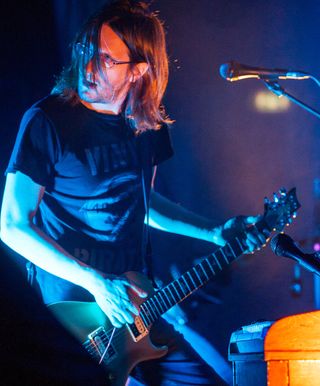
Wilson: "It's nice to be in the position where you're the guy with the vision, but you're able to work with people who can bring your vision to life." © luigi Orru/Demotix/Corbis
Let's talk about some of the musicians you played with on the tour. How did you and Niko work out a relationship as guitarists?
"My philosophy was quite simple, in that I wanted to play as little guitar as possible. [laughs] With this band, what I was very set on doing was being more of a director/frontman. I freed myself up more to perform, to connect with the audience and to enjoy the frontman role, as opposed to somebody who's constantly hopping between guitar pedals and keyboard parts, which is kind of what I have to do in Porcupine Tree, 'cause there's so much to do.
"Being a sort of occasional guitar player and occasional keyboard player in this band meant that I could give all the tricky stuff to someone who's much more qualified to play it than I am. Taking on the role of musical director, I want to continue that and take it further. For me, the precedent would be someone like Frank Zappa, who's a big hero of mine. He was so good at hiring musicians for his band who were better musicians than he was, but who didn't necessarily have the imagination, the ideas and the kind of writing chops that he had.
"It's nice to be in the position where you're the guy with the vision, but you're able to work with people who can bring your vision to life - and then some. That's really been my criteria for choosing the musicians to be in the band. They're all much, much better than I am. [laughs] Somehow, they still listen to what I have to say."
There's some moments where you and Niko get into some twin-guitar action. You guys go toe-to-toe pretty well.
"A little bit. Yeah, yeah. Sure, there are parts on the record where there are more than one guitar part going on. That's when it's time for me to strap a guitar on and start playing. I still enjoy it. There's a third of the show where I'm doing that, a third where I'm playing keyboards, and another third where I don't have any instrument - I'm just singing. It's a great journey for me, that whole two-hour show."
What about working with Nick Beggs? The Chapman Stick is still somewhat of a mysterious instrument. Does somebody who plays a Stick approach things a little differently?
"Well, of course, Nick does play standard bass, too."
Yes, absolutely.
"Because I'm not that familiar with what the Stick can and can't do, I kind of relied on him to say, 'Hey, this track could be interesting if I played it with the Stick.' This goes back to musicians having ideas beyond what I would have and bringing them to the table. Some of the things he tried the Stick on, it was like they'd always been meant for that. The piece Index, in particular, I absolutely love what he did with the Stick on that."
I have to ask: Backstage, did you ever break out with a few bars of Too Shy just to bust his chops? [Beggs was a member of '80s UK pop band Kajagoogoo.]
[laughs] "It doesn't take a lot to get him to do it, I'll tell you that. You'd think that someone like that would be sick to death of it, of having to wheel it out and play it, but he actually loves it. The thing I love about Nick is, he's one of the most positive people I've ever met. He loves everything, he's positive about everything, he never whines and moans - all of that comes out in his playing. There's a sense of joy he has about playing. He's totally unapologetic about his musical past, as he should be."
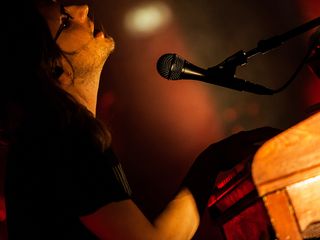
"With this band, what I was very set on doing was being more of a director/frontman," says Wilson. © luigi Orru/Demotix/Corbis
What's it like playing with Marco Minnemann? Can you describe how his approach is different to songs that Gavin Harrison has played?
"They're very different players. I mean, they're both absolutely extraordinary. You know, there's this thing on the internet at the moment - who's better, Gavin or Marco? It's kind of ridiculous, really. I think the only thing that connects them is that they've both performed songs from my first solo album - Gavin on the studio versions and now Marco on the live versions.
"I've said this about Nick, and I'll say it about Marco: he has an incredible joy about everything he does. And it's almost like, when you perform with Marco on stage, you can't help but have this big cheesy grin on your face, because some of the stuff that he's doing… he does it with such abandon. It's almost like he doesn't have discipline and technique, but of course, he does. He has masses of it. But you just don't feel that.
"I think Gavin is more of a technician. It's much more controlled. It's extraordinary and brilliant, but it's more of a controlled performance. With Marco, it's like a juggernaut, and you almost have to go with it. In a way, I like that, because it's almost like a jazz approach.
"Jazz drummers traditionally are not always prepared to just hold down the beat; it's like they're soloing the whole time. Marco is like that. He's a force of his own, and he's kind of like the backbone of the whole performance. Everybody is trying to keep up with him. I love that. It gives the music an incredible sense of… it's kinetic. There's joy and movement and spirituality that perhaps I felt were missing from other bands I was in over the years."
Debuting the song Luminol - how did that feel? How many times had the band played it before the Mexico concert?
"I think that was our fifth or sixth show in the tour, and we had done it a few times in rehearsal before then, so we were playing it pretty well. We were just beginning to relax into it. The thing about Luminol - well, two things, the first being that it was a song I wrote for the third album, but more significantly, it was the first time I wrote specifically for these musicians in mind. So I was in situation where I had a band I was really happy with, that I think is really coming together and jelling beautifully, and I decided to write some music for them to play.
"Now, I know that these guys can play things that are beyond what I would have written before. So I thought, OK, let's make use of that. Let's write music that really stretches those guys. Luminol was the first example of that. I've written the whole of the next record now, so there's a lot more music.
"We haven't recorded Luminol yet. I will say, though, that it was probably one of the most popular pieces that we played. That blew me away, because usually when you say, 'We're going to play something new,' that's when the audience is like, 'Play something we know.' You know - 'We'll patiently wait while you play your new song, but we really want to hear the old stuff.'"
When you do record Luminol for the album, will you stick closely to the way you performed it live?
"To be honest, I'm going to stay pretty faithful to the version that's on the DVD. That's the way we do it, and I love the way we do it. I'm going to record it pretty much live, so it'll very much be a studio recording of what's on the DVD. I'm very encouraged. People were going nuts for Luminol when we played it live. That really made me feel that we were doing something right. This next album is going to be something that takes things to the next level."
Joe is a freelance journalist who has, over the past few decades, interviewed hundreds of guitarists for Guitar World, Guitar Player, MusicRadar and Classic Rock. He is also a former editor of Guitar World, contributing writer for Guitar Aficionado and VP of A&R for Island Records. He’s an enthusiastic guitarist, but he’s nowhere near the likes of the people he interviews. Surprisingly, his skills are more suited to the drums. If you need a drummer for your Beatles tribute band, look him up.
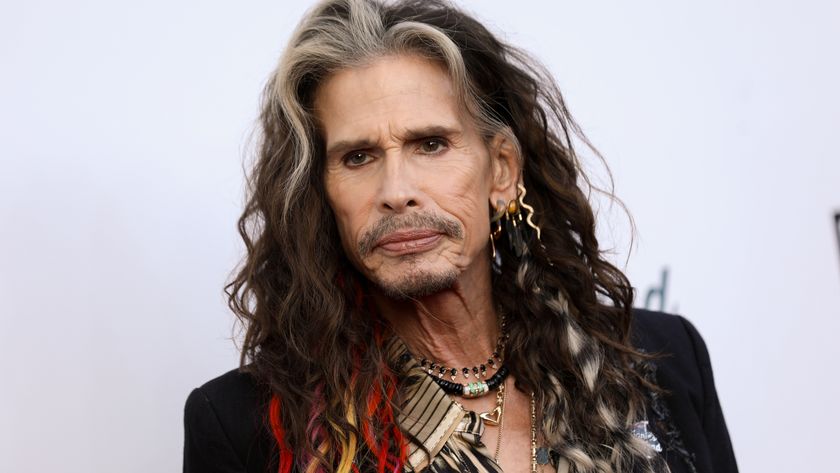
"Steven cannot put himself under the rigours of doing a full worldwide tour because there’s a lot of pressure”: Why a recent live performance from Aerosmith's Steven Tyler was a one-off
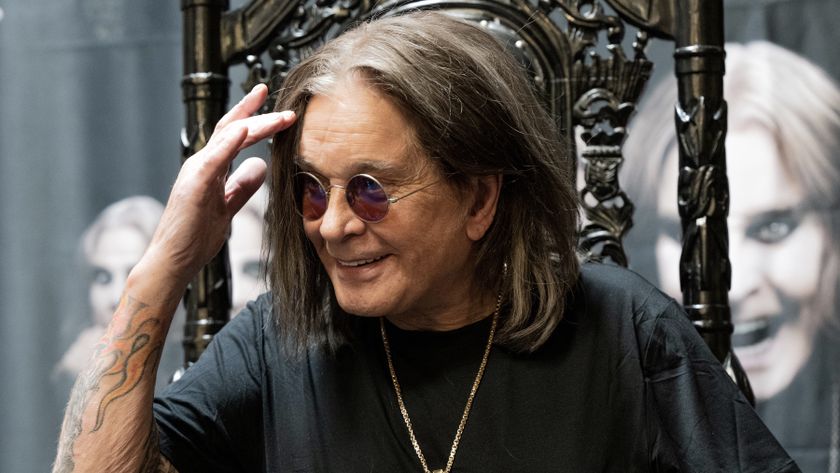
"I'm not planning on doing a set with Black Sabbath but I am doing little bits and pieces with them”: Ozzy Osbourne’s health will restrict his involvement in Villa Park gig this July
Most Popular









